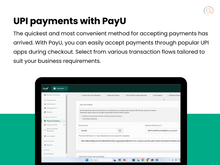PayU and Razorpay are two leading players in the online payment gateway industry, serving as crucial tools for businesses and e-commerce platforms looking to streamline their payment processes. Both aim to provide secure and efficient payment solutions.
Despite their shared objective, PayU and Razorpay differ in key features and functionalities. We have differentiated both platforms based on their pros and cons, payment methods supported, transaction charges, and more.
Let’s have a detailed comparison of PayU vs. Razorpay to find out which one is better. Discover some essential factors to consider and decide whether PayU or Razorpay fits your business.
PayU vs. Razorpay: Overview
PayU is a leading financial technology-based platform that specializes in providing innovative and secure payment solutions for businesses and consumers worldwide. With a mission to simplify the complexities associated with online payments, PayU aims to empower merchants and e-commerce businesses to enhance their customer experience while ensuring a seamless and secure transaction process. Some of the key features offered by PayU consist of data-driven insights, seamless integration, and more.
On the other hand, Razorpay is the only solution in India that enables businesses to accept, process, and disburse payments with its product suite. The platform gives hassle-free access to all payment modes including credit cards, debit cards, UPI, net banking, and wallets including JioMoney, Mobikwik, Airtel Money, FreeCharge, and more. Smart collect, developer-friendly APIs, and Razorpay X Business Banking are some of the vital functionalities offered by Razorpay.
Between PayU and Razorpay, PayU is preferred for its extensive global reach, while Razorpay offers instant settlement options and comprehensive dashboard reporting.
PayU Payment Gateway Pros and Cons
Pros:
- Wider international presence.
- Advanced features like subscription management, international payment processing, and multicurrency support.
Cons:
- Higher pricing plans, especially for low-scale businesses.
- More complex setup and integration process for beginners.
Razorpay payment Gateway Pros and Cons
Pros:
- Simple setup and user-friendly interface
- Faster settlement of funds
- Competitive pricing with a transparent fee structure
Cons:
- Limited advanced features compared to PayU
- Primarily focused on the Indian market
PayU vs. Razorpay: In Terms of Features
- Payment Methods: Razorpay and some other Razorpay alternatives offer more than 100 payment options like credit and debit cards, EMI, net banking, UPI, and mobile wallets. PayU provides over 150 payment methods, including cards, net banking, EMI, BNPL, QR, UPI, and wallets. Both platforms offer a wide range of payment options for businesses.
- Reporting and Analytics: PayU and other PayU alternatives give detailed reports on transactions, revenue, and customer behavior, but customizing these reports can be tricky. Razorpay, on the other hand, provides real-time insights with tools to visualize data, making it easier to understand and analyze. It also allows easy data export and API access for deeper financial analysis
- Mobile Payments: PayU integrates with popular mobile wallets, but its mobile checkout process may not be very user-friendly. In contrast, Razorpay focuses on a smooth mobile payment experience with a user-friendly interface that works well on different devices.
- Security: Based on the safety and security parameters, PayU is PCI DSS compliant and uses secure protocols for seamless data transmission. On the other hand, Razorpay's advanced security features like fraud prevention and tokenization make it a winner in this category.
PayU Vs Razorpay: Fee Structure
Razorpay charges a 2% platform fee on all transactions plus 18% GST, with custom pricing for enterprises earning over ₹5 lakh monthly. Their services include banking, payroll, and credit solutions. PayU charges 2% for local transactions and 3% for international/premium cards, plus 18% GST, with no setup fees and custom pricing for larger businesses.
PayU vs. Razorpay: Ease of Use
Setup and integration can be a complex process in PayU especially for beginners and smaller businesses. However, Razorpay has a user-friendly interface which makes it easy for beginners to use the payment processing platform without any hassle.
Settlement Time
When comparing settlement times, Razorpay offers quicker processing with t+2 days for domestic transactions and t+7 for international ones. On the other hand, PayU takes t+3 business days for settlements. This makes Razorpay a faster option for businesses dealing with both domestic and international payments.
Multi-Language Checkout
Razorpay offers a multi-language checkout with support for over 20 languages, including many Indian regional languages, making it highly versatile for diverse customer bases. PayU also provides a multi-language checkout option but supports fewer languages, around 7, as detailed in their documentation.
PayU vs. Razorpay: Market Share
PayU has a lower market share in India than Razorpay. Razorpay has a higher market share in India because of its ease of use and affordable pricing plans.
PayU vs. Razorpay: Global Reach
Both PayU and Razorpay offer extensive multi-currency support, making them suitable for businesses dealing with international transactions. Razorpay supports over 100 currencies, while PayU goes further, supporting more than 130 currencies. This gives PayU a slight edge over PayU in terms of global reach.
Which is better, PayU or Razorpay?
Razorpay and PayU are popular payment gateway platforms with specific strengths and weaknesses. While PayU is known for its flexible payment settlement cycles and on-demand transfers. Razorpay, on the other hand, excels in speed and performance. It is known for its user-friendly interface, making it easy for beginners and small businesses to use the platform without any hassle.


 11 Ratings & 11 Reviews
11 Ratings & 11 Reviews































